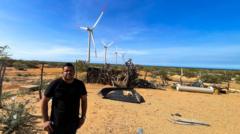Opposition against the boom in data centres in Northern Virginia intensifies as campaigners highlight potential environmental degradation and infrastructure strain tied to the industry.
Data Centre Expansion Sparks Environmental Controversy in Virginia

Data Centre Expansion Sparks Environmental Controversy in Virginia
Environmental activists, including Julie Bolthouse, raise alarm over the adverse impacts of data centre growth in Northern Virginia.
Environmental campaigners, particularly focused in Northern Virginia, are raising significant concerns regarding the rapid expansion of data centres in the region, which boasts the highest concentration of such facilities globally. Julie Bolthouse, a director of the Piedmont Environmental Council, articulates her apprehensions about the consequences of this expansion on local communities and ecosystems.
Northern Virginia, especially around Ashburn—affectionately coined "Data Centre Alley"—has become a powerhouse for data centres, hosting over 477 facilities, significantly outpacing other states like Texas and California. The region's appeal stems from its affordability and proximity to Washington D.C., alongside the booming demand driven by technologies such as artificial intelligence. According to Moody's, the industry anticipates a doubling of global data centre capacity within five years.
Bolthouse warns that the infrastructure required for these data centres is imposing considerable strain on local environments and communities. Key concerns include the construction of new electricity cables disrupting conservation areas and parks, the increasing water demands posed by data centres, and the air quality degradation linked to the facilities' reliance on backup diesel generators. Furthermore, she highlights that local households may bear the financial burden of upgrading electrical networks to support these developments.
Opposition isn't confined to Virginia. Similar grassroots movements have emerged worldwide, notably in the Republic of Ireland, where data centres utilize a staggering 21% of the nation's electricity. Critics like Tony Lowes from Friends of the Irish Environment point out the adverse climate effects of data centres relying on fossil fuels, urging initiatives to mitigate potential impacts without halting development entirely.
In response to growing unrest, major players in the data centre industry like Microsoft and Amazon Web Services are making pledges towards sustainability. Microsoft has committed to sourcing 100% renewable energy by next year and aims to be "water positive" by 2030. AWS has already implemented water conservation measures in some of its facilities.
Lobbying for environmental considerations within the data centre agenda is also gaining momentum. Statements from the Data Center Coalition assure the public that the industry is investing in renewable energy and enhancing energy efficiency across various sectors.
Campaigns in South America reflect this global trend of increased scrutiny. After local protests in Uruguay over severe water shortages, Google altered its data centre cooling technology to use less water. Chile has also witnessed backlash leading to project halts over similar concerns.
Back in Virginia, Bolthouse maintains hope for improvement in sustainability practices, suggesting that long-term financial repercussions from rising energy costs and potential water scarcity may necessitate industry reforms. Her advocacy reflects a broader call for responsible growth that balances technological demands with environmental stewardship.



















